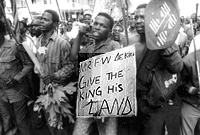This Day in History: March 31, 1994
Additional Date: March 31, 1994
In a move that was long overdue, President F.W. de Klerk imposed a state of emergency in KwaZulu-Natal, coinciding with a report by the South African Human Rights Commission (SAHRC) that it had recorded 266 political killings in Natal since the beginning of March, the highest death toll in three years. According to De Klerk the decision was taken to ensure that there was free political activity and that elections would take place in Natal. He disputed the rumour circulating that the decision was taken following the Transitional Executive Committee's insistence that such action was necessary. Security forces were given powers to detain people for thirty days without charge, to use the necessary force to maintain order and to search people and premises without a warrant. The measures also prohibited unauthorised military training and the display of weapons, including traditional weapons, and set strict conditions for marches.
African National Congress (ANC) president Nelson Mandela gave his organisation's support to the clampdown and called ANC members to co-operate with the security forces. Inkatha Freedom Party (IFP) president Mangosuthu Buthelezi described the state of emergency as humiliating and an invasion in Natal, which was likely to make elections impossible. He referred to the failure of constitutional procedures as the main reason for the declaration of the emergency.
